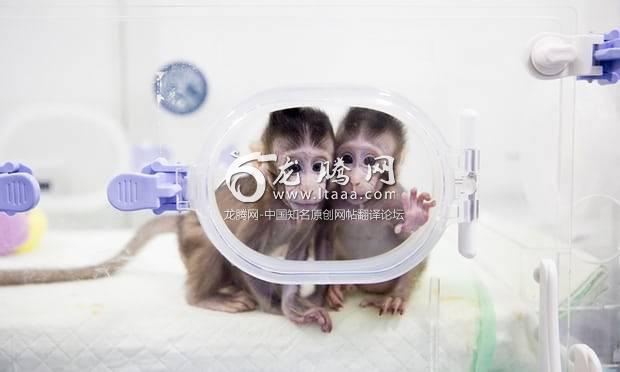中国科技大跃进(Part I) [英国媒体]
中国在生物科技,计算机和空间技术的投资取得巨大进步,他们已经领先西方了吗?我第一次见到彭笑刚是1992在遥远中国东北城市长春的吉林大学,他当时是化学系的研究生,梦想是在美国的顶级实验室上班。他当然聪明又肯干,但据我所知,大部份中国的科学系学生都一样。我只能祝他好运,认为他面临着巨大的挑战。
China’s great leap forward in science
中国科技大跃进
Chinese investment is paying off with serious advances in biotech, computing and space. Are they edging ahead of the west?
中国在生物科技,计算机和空间技术的投资取得巨大进步,他们已经领先西方了吗?
by Philip Ball
作者:菲利普-巴尔
I first met Xiaogang Peng in the summer of 1992 at Jilin University in Changchun, in the remote north-east of China, where he was a postgraduate student in the department of chemistry. He told me that his dream was to get a place at a top American lab. Now, Xiaogang was evidently smart and hard-working – but so, as far as I could see, were most Chinese science students. I wished him well, but couldn’t help thinking he’d set himself a massive challenge.
我第一次见到彭笑刚是1992在遥远中国东北城市长春的吉林大学,他当时是化学系的研究生,梦想是在美国的顶级实验室上班。他当然聪明又肯干,但据我所知,大部份中国的科学系学生都一样。我只能祝他好运,认为他面临着巨大的挑战。
Fast forward four years to when, as an editor at Nature, I publish a paper on nanotechnology from world-leading chemists at the University of California at Berkeley. Among them was Xiaogang. That 1996 paper now appears in a 10-volume compendium of the all-time best of Nature papers being published in translation in China.
四年之后,我是《自然》杂志的编辑,我推出了一编关于纳米技术的论文,作者来处加州大学伯克利分校的世界顶级科学家,作者之一便是彭笑刚。这篇96年的论文现在在自然《历史最佳论文10卷》的目录里面,正在翻译成中文在中国出版。
I watched Xiaogang go on to forge a solid career in the US, as in 2005 he became a tenured professor at the University of Arkansas. But when I recently had reason to get in touch with Xiaogang again, I discovered that he had moved back to China and is now at Zhejiang University in Hangzhou – one of the country’s foremost academic institutions.
我看着笑刚在美国的职业稳固发展,2005年,他成了阿肯色大学的终身教授。但当我最近有事要跟他联系时,我发现他现在已经回国,到中国顶级学院浙江大学去了。
For Xiaogang, it seems that America was no longer the only land of opportunity. These days, Chinese scientists stand at least as good a chance of making a global impact on science from within China itself.
对笑刚来说,美国不再像是唯一的机会之邦了。今天,中国科学家起码有机会在中国就做出全球影响力了。
The economic rise of China has been accompanied by a waxing of its scientific prowess. In January, the United States National Science Foundation reported that the number of scientific publications from China in 2016 outnumbered those from the US for the first time: 426,000 versus 409,000. Sceptics might say that it’s about quality, not quantity. But the patronising old idea that China, like the rest of east Asia, can imitate but not innovate is certainly false now.
中国经济的崛起伴随着其科学实力的增强,今年1月,美国国家科学基金会报告说,2016年,中国的科技论文数量首次超过美国:426,000比409,000。怀疑论者可能会说质量更重要,而不是数量。但是,说中国和东亚其他地区一样,会模仿不会创新的陈旧观点现在肯定是错误的。
In several scientific fields, China is starting to set the pace for others to follow. On my tour of Chinese labs in 1992, only those I saw at the flagship Peking University looked comparable to what you might find at a good university in the west. Today the resources available to China’s top scientists are enviable to many of their western counterparts. Whereas once the best Chinese scientists would pack their bags for greener pastures abroad, today it’s common for Chinese postdoctoral researchers to get experience in a leading lab in the west and then head home where the Chinese government will help them set up a lab that will eclipse their western competitors.
在几个科学领域,中国正开始带领其他人前进。 1992年我在参观中国实验室时,只有北京大学的一些旗舰项目看上去能与西方的一些优秀大学相媲美。今天,中国顶尖科学家所获得的资源让许多西方同行羡慕。以往,中国最优秀的科学家收拾行囊去海外追寻水草更加茂盛的草场, 而今天的普遍现像是,中国博士后研究员前往西方的前沿实验室获得经验再返回故乡,在那里,政府为他们设立了令西方竞争者黯然失色的实验室.
There is always a certain fraction of talented, innovative people. China has the advantage of having lots of people。Many have been lured back by the Thousand Talents Plan, in which scientists aged under 55 (whether Chinese citizens or not) are given full-time positions at prestigious universities and institutes, with larger than normal salaries and resources. “Deng Xiaoping sent many Chinese students and scholars out of China to developed countries 30 to 40 years ago, and now it is time for them to come back,” says George Fu Gao of the Institute of Microbiology of the Chinese Academy of Sciences in Beijing – who himself gained a PhD at Oxford before studying at Harvard.
总有一小部分才华横溢的创新人才。 中国有人多的优势
“千人计划”吸引了许多人,其中55岁以下的科学家(无论中国公民)被授予名牌大学和研究机构的全职职位,薪资和资源都高于正常水平。 “30-40年前,邓小平把许多学生和学者派往发达国家,现在是时候让他们回来了,”中科院微生物研究所的高福说,高福自己先在牛津获得博士学位然后去了哈佛学习。
“The startup packages for researchers in good universities in China can be significantly higher than Hong Kong universities can offer,” says Che Ting Chan, a physicist at the Hong Kong University of Science & Technology in what was previously China’s affluent and westernised neighbour. “They provide more lab space and can help settle the spouse.” That, he notes ruefully, “makes recruiting young faculty staff increasingly challenging here.” Other well-off east Asian countries, such as Singapore and South Korea, are feeling the competition too.
香港科技大学物理学家陈子廷说,“中国优秀大学给研究人员提供的初始资源可以远远高于香港的大学”。香港的大学曾是中国的富裕和西方化的邻居。 “他们提供了更多的实验室空间,还可以帮助解决配偶工作问题。”他遗憾地说,“香港招聘年轻教职员工的难度越来越大。”其他富裕的东亚国家,如新加坡和韩国,也感受到了竞争的压力。
The Chinese authorities are pursuing scientific dominance with systematic resolve. The annual expenditure on research and development in China increased from 1995 to 2013 by a factor of more than 30, and reached $234bn in 2016. The number of international publications coming out of China has remained in step with this rise. “Money is plentiful to certain Chinese researchers, possibly more so than to their competitors, especially if it means gaining an edge,” says stem-cell biologist Robin Lovell-Badge of the Francis Crick Institute in London.
中国当局正在有系统地追求科技优势地位,从1995年到2013年,中国的科研支出增加了30多倍,2016年达到了2340亿美元,中国的国际论文发表数量一直与此同步增长。 “对于某些中国研究人员来说,资金很充裕,可能要比竞争对手多,尤其是有机会领先的话”。伦敦弗朗西斯克里克研究所的干细胞生物学家Robin Lovell-Badge如是说。
The ultimate aim is to develop a homegrown, innovative research environment, says Mu-Ming Poo of the Institute of Neuroscience of the Chinese Academy of Sciences in Shanghai. “The government is beginning to recognise that big investment and recruitment of talent from abroad are not sufficient. We need to build infrastructure and mechanisms that facilitate innovation within China.” That’s not easy, and won’t happen fast. “Officially, government leaders say that taking risks is allowed, but the system of uating scientists and projects, and the philosophy and methods of instruction in university curricula, aren’t compatible with this policy.”
最终的目标是建立一个本土创新的研究环境,中科院的神经科学研究所的蒲慕明说。“政府开始意识到,花大量的投资从海外招聘人才是不够的,我们需要建立促进中国创新的基础设施和机制”。这并不容易,也不会很快。“政府领导人官方表示,冒风险可以,但是评估科学家及其项目的体系,大学课程中的教学理念与方法与这一政策并不兼容。”
China’s moon mission to boldly go a step further
中国的月球计划勇进一步
China’s strength also comes down to sheer numbers, though. “There is always a certain fraction of talented people who are innovative,” says Chan. “China has the advantage of having a lot of people.”
中国的优势也体现在绝对数字上。 “总会有一小部分有创造力的人才,”陈说。 “中国有人多的优势。”
One of the more controversial ways Chinese institutions encourage their researchers to publish high-profile papers is to offer cash incentives. One study found that on average a paper in Nature or Science could earn the author a bonus of almost $44,000 in 2016. The highest prize on offer was as much as $165,000 for a single paper, up to 20 times a typical university professor’s annual salary.
广受争议的激励方法之一是,中国机构给发表高质量论文的研究人员提供现金奖励。 有调查发现,在<<自然>>或<<科学>>杂志的论文,,在2016年平均来说可以为作者带来近44,000美元的奖金。最高是一份论文165,000美元,高达典型大学教授年薪的20倍。
According to quantum physicist Jian-Wei Pan of the University of Science and Technology in Hefei, as a relative latecomer to the global scientific stage, China needs such incentives as a way of maintaining enthusiasm. Chan adds that “the rewarding system is transparent, and the expectation of the senior administration is clearly spelled out. Most of my friends in China don’t see this as a problem – many feel that any formula, even if it’s simple and naive, is better than no formula.”
据合肥科技大学量子物理学家潘建伟介绍,作为全球科学发展的后来者,中国需要这样的激励措施来维持热情。 潘补充说:“奖励制度是透明的,高级管理部门的期望明确。 我在中国的大多数朋友都认为这没有什么问题 - 许多人认为这过于公式化,甚至简陋无知,但总是强于没有。”
But could it not tempt researchers to cheat – fabricate or cherrypick results so that they can claim a dramatic discovery? The 2016 study of cash incentives also reported a rise in plagiarism, ghostwritten papers and other dishonest attempts to get published. Poo says that, whatever the case, the practice of cash incentives is not widespread. “Only a few low-level research institutions are doing this, not the Chinese Academy of Sciences or top universities,” he says. He thinks that problems with scientific misconduct and fraud in China have more to do with poor quality control or lack of punitive measures.
但是,它不会诱使研究人员作弊--炮制结果使其发现显得激动人心的吗? 2016年对现金激励措施的研究也报道了剽窃,代写等其他不诚实的行为来发表论文。 潘说,无论如何,现金激励的做法并不普遍。 他说:“只有少数水平较低的研究机构正推行,不是中科院或其它一流大学。” 他认为中国科学不端行为和欺诈问题更多的是与质量控制不力或缺乏惩罚措施有关。
However, the pattern seems clear, and is worth heeding by other nations: despite China’s reputation for authoritarian and hierarchical rule, in science the approach seems to be to ensure that top researchers are well supported with funding and resources, and then to leave them to get on with it.
然而,这种模式似乎很清楚,值得其他国家研究:尽管中国在ZZ和等级制度方面的名声,在科学方面,这种做法似乎是为了确保顶尖研究人员得到资金和资源的充分支持,让他们继续下去。
Cloning, embryology and virology
克隆,胚胎学和病毒学
The recent news that a laboratory in Shanghai has succeeded in cloning macaque monkeys made world headlines not just because of the impressive scientific feat but because of the implications for humans. While mammals from sheep (Dolly in 1997) to pigs, dogs and cows have been cloned before, primates have been a problem. Mu-Ming Poo and his colleagues
cracked the problem by treating the monkey eggs into which the genetic material of the cloned individual had been placed with a cocktail of molecules that awaken the genes needed to promote development into an embryo. The Chinese team has so far only produced healthy baby monkeys by cloning cells taken from other monkey foetuses, not from adult monkeys. But Poo tells me: “I think cloning using adult cells will be accomplished soon, probably within one year.”
最近,上海的一家实验室成功克隆猕猴成为世界头条新闻,不仅因为科学壮举,而且因其对人类的意义。 虽然哺乳动物从绵羊(多利在1997年)到猪,狗和牛已经被克隆过,但灵长类动物一直是个难题。 蒲慕明和他的同解决了这个问题,将猕猴卵子注入带分子混合物的克隆个体的基因材料来唤醒促进胚胎发育所需要的基因。到目前为止,中国队通过克隆其他猴胎的细胞而不是成年猴子来产生健康的小猴子。 但潘告诉我:“我认为使用成猴细胞进行克隆很快就会完成,可能就在一年内。
Such experiments on our close evolutionary relatives raise ethical concerns, all the more so because there were many failures: only two live births out of 79 attempts. Nonetheless, the work makes human reproductive cloning look more feasible in principle.
And despite the ethical issues surrounding such research (many countries ban it, including the UK), the magnitude and cost of the work already undertaken reinforces a sense that if China sets its sights on a particular scientific or technological target, nothing will get in its way.
对我们进化近亲的这种实验引发了伦理问题,尤其是有很多实验失败了:在79次尝试中只有两次顺利产来。 尽管如此,这项工作理论上使人类克隆看起来更加可行。 尽管围绕此类研究的伦理问题(包括英国在内的许多国家都被禁止),但已经开展的工作的规模强度和成本加强了这样一种感觉,即如果中国将目光瞄准某一特定的科技目标,他们就不会放弃。
It’s with good reason Poo asserts that China has become a world leader in stem-cell science and regenerative medicine. Researchers at Sun Yat-sen University in Guangzhou created similar surprise and alarm when in 2015 they announced the first use of high-precision gene-editing in a human embryo – not for reproductive medicine but to examine the viability of the technique to edit a disease-causing gene variant, using IVF embryos that could not develop further.That work was refused publication in the leading journals Nature and Science on ethical grounds, although related work has now been licensed and conducted in the UK. “Genome biology has been well supported in China for some time, with huge investment in genome sequencing projects,” says Lovell-Badge.
这对潘所声称的中国已经成为干细胞科学和再生医学领域的世界领先者这一言论来说是很的支撑。同样,当广州中山大学的研究人员在2015年宣布首次在人类胚胎中使用高精度基因编辑,这也同样让人惊讶与惊吓。这一项目的目的不是生殖医学,而是为是测试编辑疾病引发的基因变异的技术可行性,项目使用了无法进一步发育的IVF胚胎。尽管相关内容现已在英国获得许可和管理,领先的《自然》与《科学》杂志出于道理理由拒绝发表这一成果。 “基因组生物学在中国得到了很好的支持,在基因组测序项目上投入巨资,”Lovell-Badge如是说。
There’s perhaps a temptation to ascribe some of China’s dominance here to a looser regulatory environment, but Lovell-Badge says that may not be the case. “Work on pigs and macaques is much easier and cheaper to do in China than in Europe and the US – it’s not necessarily anything to do with animal research ethics,” he says.
“The best scientists want their work to be accepted in the west, so many have been trained by western scientists and their facilities designed with guidance from the west. But it is wrong to say that there are no restrictions. There may not be strict laws or even regulations, but there are strict guidelines – and if these are not followed, the consequences can be severe to the scientists involved.”
也许有人试图将中国的一些优势地位归因于宽松的监管环境,但Lovell-Badge认为情况可能并非如此。 “在中国做生猪和猕猴的实验要比在欧洲和美国要便宜得多 - 它不一定与动物研究伦理有关。 他说,“最好的科学家希望他们的工作被西方接受,很多科学家都接受过西方的培训,他们的设施都是在西方的指导下设计的。 但是说没有限制是不对的。 他们可能没有严格的法律法规,但是有严格的指导方针 - 如果不遵守,对相关的科学家来说,后果可能会很严重。”
China is taking great strides in other areas of biological science too. The waves of deadly bird flu that have afflicted the country annually since it was first detected in 2013 supply a very urgent need for research in virology. Chinese researchers had already learnt a lot about viral epidemics, says George Gao, after the outbreak of the particularly virulent form of influenza that caused SARS (severe acute respiratory syndrome) in 2002-3, originating in Guangzhou.
中国在生物科学的其他领域也取得了长足的进步。 自2013年以来,每年造成全国性感染的致命禽流感疫情为病毒学研究提供了迫切的需求。 高福说,中国研究人员在病毒流行病方面已经取得了很大的成果,,特别是在2002-3年发源于广州的高致命性SARS(非典型肺炎)爆发后。
Gao’s work has focused on understanding how ‘zoonotic’ viruses like bird flu, which cross from animals to humans, are transmitted across species. He has also looked at the structures and molecular mechanisms of the SARS, Ebola, Zika and MERS (Middle East respiratory syndrome) viruses, all of which potentially pose global threats. The government has invested heavily in this field, he says, but he has no illusions that China still has some catching up to do. “In my opinion we are yet far behind US science in general. And we need a better system to encourage businesses to develop basic research.”
高福的工作重点在于理解动物传染病,比如像禽流感是如何跨物种传染的。他还研究了SARS,埃博拉,Zika和MERS(中东呼吸综合征)病毒的结构和分子机制,所有这些都可能构成全球威胁。“政府已经在这个领域投入了大量资金,但他不抱任何幻想,中国要追上还有很远", 他说, “在我看来,我们在整体上还远远落后于美国。 我们需要一个更好的体系来鼓励企业开展基础研究。“
版权声明
我们致力于传递世界各地老百姓最真实、最直接、最详尽的对中国的看法
【版权与免责声明】如发现内容存在版权问题,烦请提供相关信息发邮件,
我们将及时沟通与处理。本站内容除非来源注明五毛网,否则均为网友转载,涉及言论、版权与本站无关。
本文仅代表作者观点,不代表本站立场。
本文来自网络,如有侵权及时联系本网站。
图文文章RECOMMEND
热门文章HOT NEWS
-
1
最近,新冠肺炎疫情在日本有扩大的趋势,有专家呼吁日本应当举国行动起来,共...
- 2
- 3
- 4
- 5
- 6
- 7
- 8
- 9
- 10
推荐文章HOT NEWS
-
1
最近,新冠肺炎疫情在日本有扩大的趋势,有专家呼吁日本应当举国行动起来,共...
- 2
- 3
- 4
- 5
- 6
- 7
- 8
- 9
- 10












